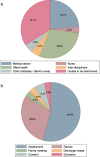The experience of interpreter access and language discordant clinical encounters in Australian health care: a mixed methods exploration
- PMID: 30249270
- PMCID: PMC6154887
- DOI: 10.1186/s12939-018-0865-2
The experience of interpreter access and language discordant clinical encounters in Australian health care: a mixed methods exploration
Abstract
Background: Current evidence highlights that language discordant clinical encounters seriously compromise patient quality of care and health outcomes. We aimed to characterise patterns of interpreter service use in medical inpatient wards use and explore clinician experience of language discordance.
Methods: Participants included medical students, residents, attending physicians, nursing and allied health professionals working in General Internal Medicine wards across two tertiary referral hospitals servicing a large Australian health care area. This study involved a retrospective electronic medical record audit of interpreter use. Six focus groups were conducted with 32 participants. Data were analysed using an inductive thematic approach with constant comparison.
Results: Allied health professionals were identified as the largest users of interpreter services, followed by medical doctors. Distinct themes emerged regarding clinician experiences of language discordant encounters including: (1) Negotiating care when unable to get an accurate assessment; (2) Over servicing to fill in the gaps; (3) Using family members instead of professional interpreters: a vexed solution; (4) Disparities in care provision; and (5) Communication drought: broken by a flood.
Conclusions: Patients with low English proficiency are at risk of being less informed of care processes, and having a very large volume of information given in a shorter period of time when an interpreter is present. There is a need for systematic and transformative change that addresses utilisation of professional interpreters as well as embedded healthcare culture and practices leading to less interaction with patients with limited English proficiency and reliance on family members as informal interpreters.
Keywords: Access to care; Inpatient medicine; Language discordance; Qualitative.
Conflict of interest statement
Ethics approval and consent to participate
This project received approval from Monash Health Human Research Ethics Committee (Monash Health Ref: RES-17-0000104 L). All participants in the qualitative phase of this study provided written informed consent.
Consent for publication
Not applicable.
Competing interests
The authors declare that they have no competing interests.
Publisher’s Note
Springer Nature remains neutral with regard to jurisdictional claims in published maps and institutional affiliations.
Figures


References
-
- Booth H, Tickle L. The future aged: new projections of Australia's elderly population. Australas J Ageing. 2003;22:196–202. doi: 10.1111/j.1741-6612.2003.tb00497.x. - DOI
-
- Australian Bureau of Statistics. Census of population and housing; Australia revealed, 2017. Canberra: ACT; 2017.
-
- Office for National Statistics. Population by country of birth and nationality. London: Office for National Statistics; 2012.
-
- Ngo-Metzger Q, Sorkin D, Phillips R, Greenfield S, Massagli M, Clarridge B, Kaplan S. Providing high-quality care for limited English proficient patients: the importance of language concordance and interpreter use. J Gen Intern Med. 2007;22:324–330. doi: 10.1007/s11606-007-0340-z. - DOI - PMC - PubMed
Publication types
MeSH terms
LinkOut - more resources
Full Text Sources
Other Literature Sources

